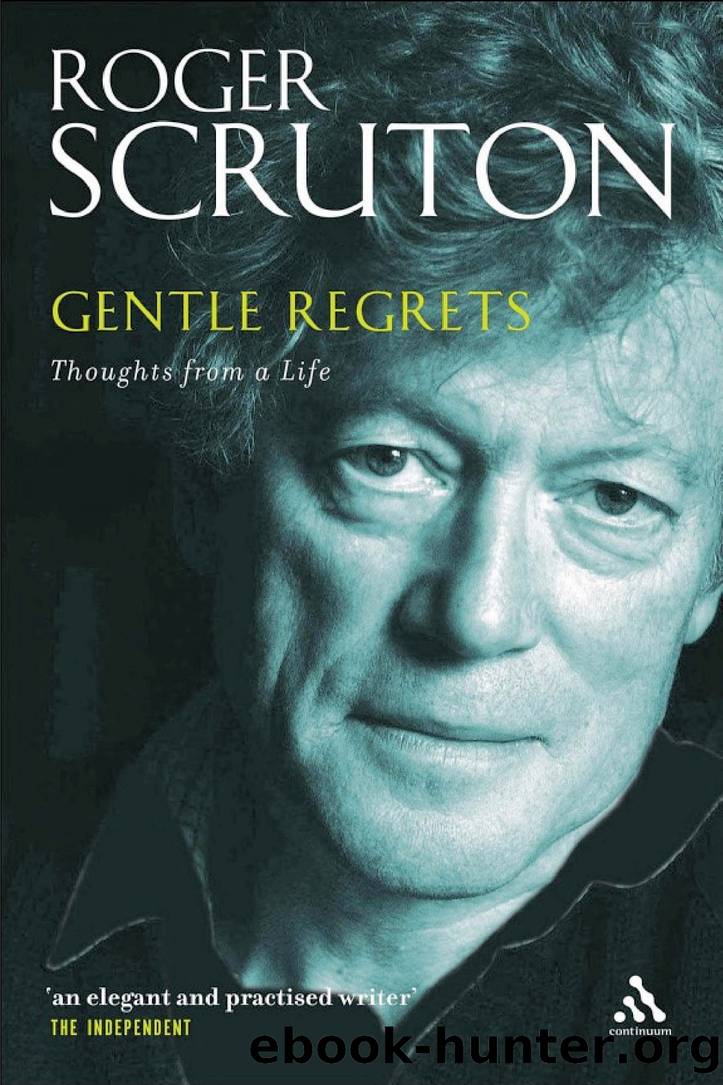Gentle Regrets: Thoughts From a Life by Roger Scruton

Author:Roger Scruton [Scruton, Roger]
Language: eng
Format: epub
Tags: Autobiography, Biography, Non-Fiction, Personal Memoirs
ISBN: 9781472927859
Google: K8ofCgAAQBAJ
Amazon: 0826480330
Publisher: Continuum
Published: 2006-10-04T23:00:00+00:00
7
Sleeping Cities
During the 1980s I often travelled to Eastern Europe, hoping to make some small contribution to the anti-communist cause. My main points of call were cities, and my errands took me equally to their ancient hearts and their dismal peripheries. Of old Warsaw little remained apart from the centre, which had been burned by the Nazis and then painstakingly restored as a Renaissance city fortress. Prague and Budapest, however, had come through the war more or less unscathed. Subsequent building had been restricted to outlying socialist housing projects, with the occasional faceless block in the city centre, devoted to some inscrutable Party function and surrounded by armed guards.
A red star had been affixed to the dome of the beautiful Hungarian Parliament – a neo-Gothic castle inspired by Westminster – signifying that it was now an annex of the functionalist block next door, headquarters of the Communist Party. The same red star had been scattered over the roofs and pinnacles of Prague, giving to the dilapidated palaces a sad and temporary air, like ornaments from last year’s Christmas. The façades of public buildings were defaced with slogans: ‘Fight for Peace’, ‘Forward in Brotherhood with the Soviet Union’, ‘The Programme of the Party is the Programme of the People’, and similar inanities, which caught the attention only because they coincided, more or less, with the jargon and the sentiments of the textbooks studied in British departments of sociology.
Almost every street would contain long platforms, raised on wooden stakes above the pavement to protect pedestrians from the slow, steady rain of stucco that fell from the untended walls. Since all buildings were publicly owned, no building was cared for, and visitors to Prague were granted the spectacle of a baroque city – a city of surfaces – the hollow core of which showed through its crumbling skin. Despite this, and also because of it, Prague seemed utterly removed from the real world, a relic of vanished life, frozen in its final posture. Arriving there was like entering the room of someone who has died, and whose belongings lie untouched and decaying where he left them.
This experience was especially vivid if you took the bus from the airport to the quarter then named Leninova, and changed to the tram that clattered down the cobbled hillside into town. By this route you entered Prague through Malà Strana, the ‘Little Side’, which grew up in the sixteenth and seventeenth centuries beneath the castle of Hradčany, hemmed in between the hill and the river. Domes and campaniles crowd into the bowl of the Little Side, and behind them a peaceful orchard stretches on the hillside towards the twin-towered monastery of Strahov. Each building embraces its neighbour, gable touching gable, curlicue wrapped in curlicue, roof sloping into roof. Cornices and string courses shoot sideways, rush together like laughing streams, and lose themselves in foreign windowsills. Turrets and pediments poke above the clutter, and here and there the crumbling wall of a palace abruptly severs the street. The
Download
This site does not store any files on its server. We only index and link to content provided by other sites. Please contact the content providers to delete copyright contents if any and email us, we'll remove relevant links or contents immediately.
Hit Refresh by Satya Nadella(8338)
When Breath Becomes Air by Paul Kalanithi(7264)
The Girl Without a Voice by Casey Watson(7263)
Do No Harm Stories of Life, Death and Brain Surgery by Henry Marsh(6336)
A Court of Wings and Ruin by Sarah J. Maas(6075)
Hunger by Roxane Gay(4216)
Shoe Dog by Phil Knight(4167)
Everything Happens for a Reason by Kate Bowler(4067)
A Higher Loyalty: Truth, Lies, and Leadership by James Comey(4032)
The Rules Do Not Apply by Ariel Levy(3906)
Tuesdays with Morrie by Mitch Albom(3832)
The Immortal Life of Henrietta Lacks by Rebecca Skloot(3826)
How to Change Your Mind by Michael Pollan(3678)
Millionaire: The Philanderer, Gambler, and Duelist Who Invented Modern Finance by Janet Gleeson(3569)
All Creatures Great and Small by James Herriot(3516)
Elon Musk by Ashlee Vance(3455)
Tokyo Vice: An American Reporter on the Police Beat in Japan by Jake Adelstein(3440)
Man and His Symbols by Carl Gustav Jung(3315)
The Money Culture by Michael Lewis(3284)
